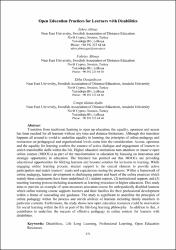| dc.contributor.author | Altınay, Zehra | |
| dc.contributor.author | Altınay, Fahriye | |
| dc.contributor.author | OssiAnılsson, Ebba | |
| dc.contributor.author | Aydın, Cengiz Hakan | |
| dc.date.accessioned | 2019-10-18T18:43:35Z | |
| dc.date.available | 2019-10-18T18:43:35Z | |
| dc.date.issued | 2018 | |
| dc.identifier.issn | 2067-3957 | |
| dc.identifier.uri | https://hdl.handle.net/11421/10338 | |
| dc.description | WOS: 000451862700016 | en_US |
| dc.description.abstract | Transition from traditional learning to open up education, the equality, openness and access has been reached for all learners without any time and distance limitations. Although this transition happens all around to world to underline equality in learning, the principles of online pedagogy and restructure on pedagogical and organizational levels come into the consideration. Access, openness and the equality for learning confirm the essence of active dialogue and engagement of learners to enrich transferable skills within the life. Higher education institutions turn attention on massive open online courses (MOOCs) as part of the transformation in education by focusing on innovation and strategic opportunity in education. The literature has pointed out that MOOCs are providing educational opportunities for lifelong learners and become solution for inclusion in learning. While engaging online learning process, student support is the crucial element to provide active participation and match learners' needs and expectations during the process. Within a framework of online pedagogy, learner development is challenging pattern and heart of the online practices which mainly three components have been underlined: (1) student support, (2) institutional support, and (3) teaching learning process including assessment as learning procedure in higher education. This study aims to provide an example of open resources education course for orthopedically disabled learners which online training course supports learners and their families for their professional development within a frame of counseling and guidance. The study is significant to underline the principles of online pedagogy within the process and enrich abilities of learners including family members in particular contents. Furthermore, the study shows how open education resources could be motivation for social learning within the life as part of the life-long learning philosophy. In addition to that, it contributes to underline the success of effective pedagogy in online context for learners with disabilities. | en_US |
| dc.language.iso | eng | en_US |
| dc.publisher | Edusoft Publishing | en_US |
| dc.rights | info:eu-repo/semantics/openAccess | en_US |
| dc.subject | Disabilities | en_US |
| dc.subject | Life Long Learning | en_US |
| dc.subject | Professional Learning | en_US |
| dc.subject | Open Education Resources | en_US |
| dc.title | Open Education Practices for Learners with Disabilities | en_US |
| dc.type | article | en_US |
| dc.relation.journal | Brain-Broad Research in Artificial Intelligence and Neuroscience | en_US |
| dc.contributor.department | Anadolu Üniversitesi | en_US |
| dc.identifier.volume | 9 | en_US |
| dc.identifier.issue | 4 | en_US |
| dc.identifier.startpage | 171 | en_US |
| dc.identifier.endpage | 176 | en_US |
| dc.relation.publicationcategory | Makale - Uluslararası Hakemli Dergi - Kurum Öğretim Elemanı | en_US |


















